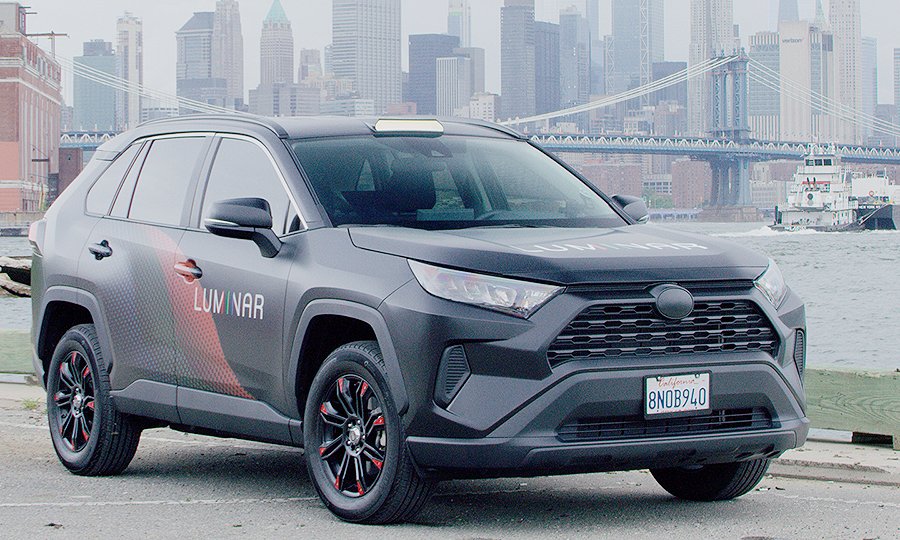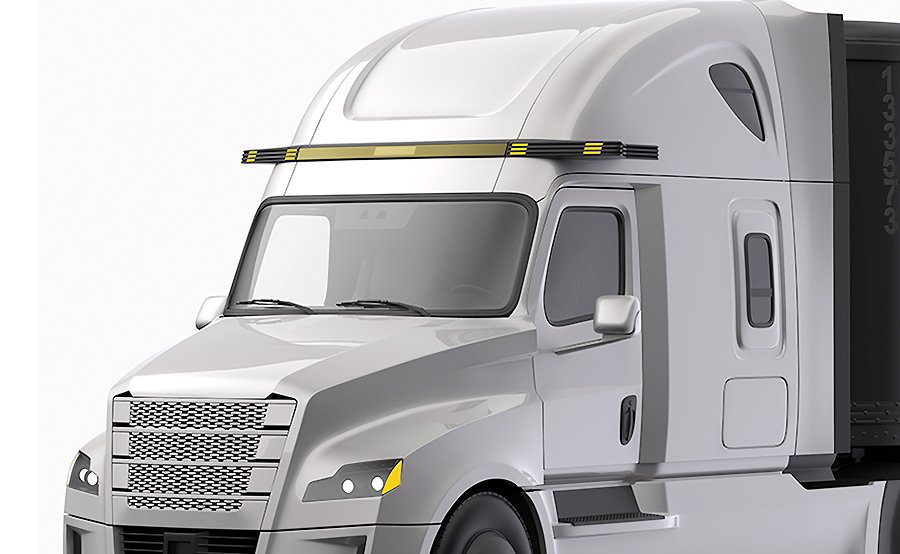<!–*/ */ /*–>*/
| Luminar integrates lidar into roofline with Blade concept |

When some people think of lidar sensors, they might think of large, bulky, rotating hardware mounted to the roof of a vehicle.
But Luminar Technologies Inc. has a different design vision.
Luminar introduced Blade, a concept for a next-generation lidar system that can be built into the structure of a vehicle, during the company’s inaugural Studio Day in New York City on Tuesday.
It’s less obvious, less obtrusive and plays into Luminar’s idea for a more aesthetically pleasing and practical integration of autonomous technology “across robotaxis, trucking and passenger cars,” the company said.
Luminar formulated the concept with design studio NewDealDesign.
“To create the best overall car design and the best user experience, autonomous technology must be engineered and designed hand-in-hand from the ground up,” Jason Wojack, senior vice president of product development at Luminar, said in a statement. “Focusing on form and function at not just the lidar level but the vehicle level has enabled Luminar to spearhead the design integration of autonomous technology faster than any historical design breakthrough in automotive history.”
Luminar said its lidar, Iris, was designed to be “cleanly integrated into the vehicle roofline, offering the optimal vantage point for enabling autonomy while maintaining the aerodynamics that auto enthusiasts crave.”

Iris will begin series production on the Volvo XC90 next year. SAIC, Daimler Trucks North America and Pony.ai are also expected to integrate Luminar’s Iris.
The company demonstrated two concepts, including a robotaxi design, for which the Blade would run across the crown of the vehicle, incorporating four Luminar lidar sensors. Luminar also showed a trucking design with a three-sensor configuration for optimized long-range vision. The autonomous design integration would also offer a retrofitting application.
—Alexa St. John
What you need to know
GM ups EV spending again General Motors said Wednesday it is increasing its planned investment in electric and autonomous vehicles to $35 billion through 2025, including two additional U.S. battery plants. GM said the strong profits it has generated in recent quarters are enabling the company to increase its commitment to EVs and AVs. Its new $35 billion target represents 30 percent more than executives announced in November and 75 percent more than the automaker’s pre-pandemic plans.
Lincoln to offer 4 all-electric models by 2030 Lincoln Motor Co. plans to expand its lineup in the U.S. and introduce four new battery-electric products by 2030 as it transitions to an electrified portfolio to match its luxury rivals. Executives at Ford Motor Co.’s premium brand said Wednesday they expect that by 2026, half of all sales globally will be of zero-emission vehicles. By the end of the decade, each nameplate Lincoln offers globally will come with an electrified variant, although the brand expects to still sell at least some gasoline-powered models then.
Toyota says it’s too early to focus on electric cars only Toyota Motor Corp.’s lineup over the next 30 years will contain a myriad of options beyond just electric vehicles, executives at an annual shareholder meeting said Wednesday. “It’s too early to concentrate on one option,” said director Shigeki Terashi, responding to an investor’s question about why the world’s biggest carmaker is taking a different electrification route from Honda Motor Co., which is targeting all-electric vehicle sales by 2040.
Waymo secures $2.5 billion more from investors Once again, Waymo is flush with funding. The self-driving technology company said Wednesday it added $2.5 billion more to its coffers from investors. The news comes a little more than a year after the company raised $3 billion in its first external funding round. The company’s leadership team sees the further investment as a sign that Waymo remains on the right track.
Roundup
AV startup Refraction AI’s driverless robots to deliver pizza in Texas.
FedEx, Nuro partner on autonomous delivery in Houston.
GM-backed Cruise to access $5 billion credit line.
Volkswagen Group is gearing up to make and sell considerably more electric vehicles in North America.
Mazda aims to launch 13 electrified vehicles by 2025.
Polestar to build EV in U.S. starting next year.
TuSimple’s self-driving truck network expanding eastward via Texas.
Monday: Lordstown Motors Corp. says CEO Steve Burns and CFO Julio Rodriguez have resigned, days after the electric truck maker warned that it had “substantial doubt” about its ability to continue as a going concern in the next year. Tuesday: The startup’s president says Lordstown has “firm” and “binding” orders for the first two years of production of its electric pickup. Thursday: Lordstown says it did not have any binding purchase orders or commitments from customers.
China’s Huawei Technologies aims to develop driverless-car technology by 2025.
Meanwhile, Chinese e-commerce giant Alibaba Group Holdings is forming an R&D program to create a driverless truck for its logistics business.
Toyota is toying with a new way to personalize vehicle software updates to improve the way people drive.
Electric vehicle company Workhorse Group has filed a legal challenge to the U.S. Postal Service decision to award a multibillion-dollar, 10-year contract to Oshkosh Defense.
GM’s Super Cruise studied for how drivers actually use it.
Shyft Group is developing its first all-electric chassis platform to meet growing demand from major parcel delivery customers including Amazon, FedEx and UPS.
Advanced driver-assist systems are key to preventing alcohol-related traffic deaths, Mothers Against Drunk Driving advocates say on “Daily Drive” podcast.
Brain food
Large spending on EVs may not pay off for several years, says the latest Global Automotive Outlook from consultancy AlixPartners.
Last mile
Hyundai Motor Co. has accelerated efforts around developing air taxis and will offer services around those vehicles rather than just selling them, Jose Muñoz, Hyundai’s global COO, told Reuters.

